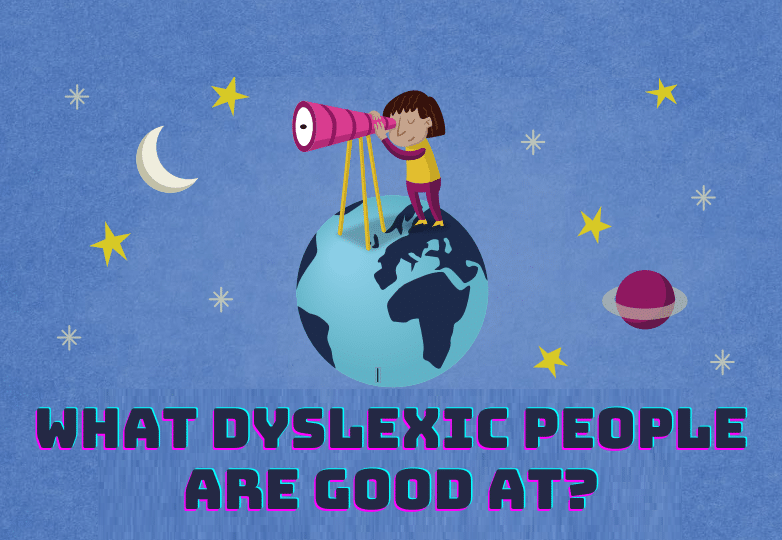Dyslexia and anxiety are linked. The challenges associated with dyslexia, including difficulties in academic tasks, negative feedback, and fear of exposure, can contribute to feelings of anxiety and frustration.
Dyslexia:
In 1887, Dr. J.M. Berlin discovered that dyslexia is a neurological process that affects how the brain processes information.
Dyslexia is different for everyone, from mild to severe. It goes beyond literacy difficulties, affecting different aspects of cognitive functioning.
For example, individuals may have difficulty remembering names or letters, forming thoughts, and repeatedly misreading text.
Even a basic math question like “What is 3+5=?” for someone with extreme dyslexia would seem daunting, needing more time and effort to figure out the answer, because of the specific way their brain processes information.
Dyslexia and Anxiety:
Dyslexia can significantly contribute to feelings of frustration and, in some cases, to anxiety. Feelings of frustration in academy and facing difficulty in daily tasks can create a sense of inadequacy and failure.
Following are a few more ways in which dyslexia and anxiety are interconnected:
- Misunderstood Abilities: People with dyslexia often have unique strengths and talents, such as creativity, problem-solving, or spatial reasoning. However, these talents might be overlooked or undervalued in a system that primarily emphasizes traditional academic skills or memorizing, potentially leading to a negative self-image.
- Negative Feedback: Receiving criticism or corrections for mistakes made due to dyslexia can reinforce a negative self-belief. It can contribute to fear of failure and reluctance to engage in activities that could lead to potential mistakes.
- Struggling with Basic Tasks: Simple tasks, like reading aloud or following written instructions, can be challenging. Struggling with such simple tasks that others find effortless can create a sense of helplessness.
- Emotional Toll: The cumulative impact of reading or writing struggles and negative experiences can take an emotional toll, leading to feelings of frustration, disappointment, and anxiety, especially when faced with tasks that highlight their difficulties.
- Fear of Exposure: Fear of being exposed as less competent or intelligent than others can lead to anxiety in social and academic situations. This fear may contribute to avoidance behaviors, such as skipping classes or avoiding reading aloud, further impacting self-esteem.
Dyslexia and anxiety can go hand-in-hand. If not addressed, the emotional toll can have long-term consequences, potentially leading to a messed-up self-image or low confidence.
What people with dyslexia are good at?

Here are some areas where people with dyslexia tend to excel:
Thinking Outside the Box:
People with dyslexia often demonstrate exceptional creativity and the ability to think beyond average boundaries. They think outside of the box, meaning approach problems in their own ways, and offer unique solutions.
Different Outlook:
They often perceive the world differently, having a unique perspective on life, events, patterns, and numbers. This distinct viewpoint can contribute to creative thinking and problem-solving.
Imagination:
Good with imagination, they may possess a rich and vivid imagination. This imaginative capacity can be channeled into various creative pursuits, including art, storytelling, or innovation, etc.
Visual Thinking:
They are visual thinkers, relying on mental images to process information. This visual-spatial thinking style can be a strength in problem-solving tasks, enabling them to visualize solutions and understand complex relationships.
It’s essential to recognize that while dyslexia may present challenges in traditional academic areas like reading or writing they often excel in areas that require creative thinking, visualization, and problem-solving.
Coping Mechanisms: Dyslexia and Anxiety
The best coping mechanism for people with dyslexia and anxiety stemming from it, is adopting personalized strategies to manage challenges and enhance learning experiences. Figure out what works for you, and what does not work for you.
Here are some more techniques:
Picture Power for Better Memory:

To help remember words, connect them to pictures in your mind.
It’s like creating a story in your mind with images, making learning more interesting and easy to remember.
Smart Ways to Remember Words or Alphabets:
When letters or words are tricky, organize them logically and link them to personal stuff.
For example, if “T” is causing a brain freeze, think of it as a teacup. Connect it to things you love, like your favorite drink. This trick makes learning feel more personal and less stressful.
Knowing Your Strengths:
Take a moment to think about what you’re good at. Did you know that lots of really successful people, even 40% of millionaires, have dyslexia?
Figuring out what works best for you is like discovering your superpower. It boosts confidence and can make learning more positive and less worrying.
Understanding yourself better can be a big encouragement, possibly easing anxiety about life and school stuff.
Recap:
Dyslexia is different for everyone, and it varies from mild to severe. In severe cases, it can cause difficulties in memory, forming thoughts, and reading.
It can lead to frustration and anxiety due to challenges in academic and daily tasks. The interconnected issues include misunderstood abilities, struggling with basic tasks, and fear of exposure. If not addressed, the emotional toll can have long-term consequences.
Strengths of People with Dyslexia:
Despite challenges, individuals excel in creative thinking, unique perspectives, rich imagination, and visual-spatial thinking. While facing difficulties in traditional academic areas, they often shine in creative pursuits and problem-solving.
Coping Mechanisms:
Coping mechanisms involve personalized strategies, such as associating words with pictures for better memory, logically connecting tricky letters to personal elements, recognizing personal strengths, and adopting a positive mindset.
Understanding oneself is crucial, potentially easing anxiety about life and academic challenges.
Inspiration and Resources:
The author of this article took inspiration and help from an E-book in the following link, Nessy. They have done extraordinary job in explaining what Dyslexia is and how to get better at it.
Frequent Asked Questions (FAQs):
- Can anxiety cause dyslexia?
Anxiety itself doesn’t cause dyslexia. Dyslexia is specific and different way of how the brain processes information, discovered by Dr. J.M. Berlin in 1887. However, it can lead to feelings of frustration and anxiety due to challenges in academic and daily tasks.
- What is the connection between Dyslexia and Overthinking?
This type of overthinking inducing self-doubt often stems from the need for repeated activities to grasp certain concepts, such as phonological sounds, words, and their meaning, etc which contributes to mental exhaustion and increases the likelihood of racing thoughts.
- Does dyslexia affect anxiety?
Yes, it can affect anxiety. The challenges individuals may face, such as misunderstood abilities, negative feedback, struggling with basic tasks, emotional toll, and fear of exposure, can contribute to feelings of anxiety and inadequacy.
- Can you develop dyslexia from anxiety?
Anxiety doesn’t cause dyslexia. Dyslexia is a neurological condition that tells individuals’ ability to process information. However, anxiety resulting from the challenges of dyslexia can exacerbate the condition’s impact on individuals.
- Is dyslexia linked to anxiety?
Yes, dyslexia and anxiety are linked. The challenges associated, including difficulties in academic tasks, negative feedback, and fear of exposure, can contribute to feelings of anxiety and frustration. If not addressed, chronic anxiety can have long-term consequences on individuals’ self-esteem and confidence.
Related Content:
Overthinking in a Dyslexic Mind







